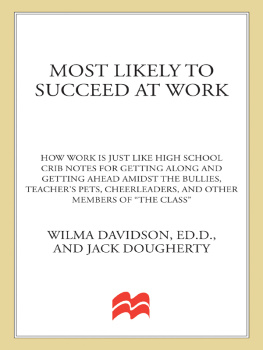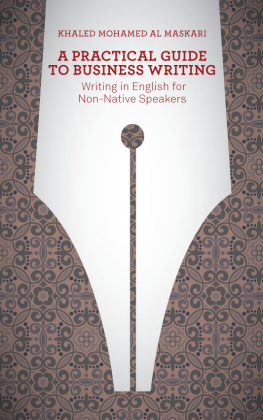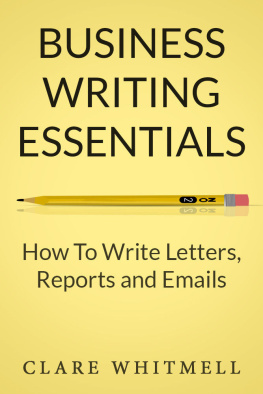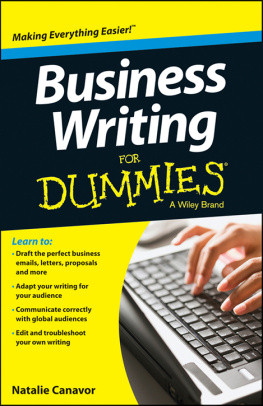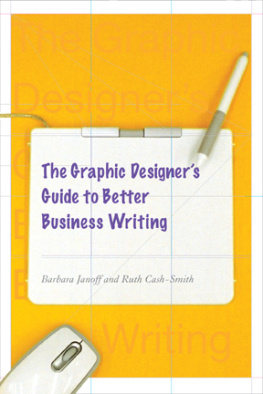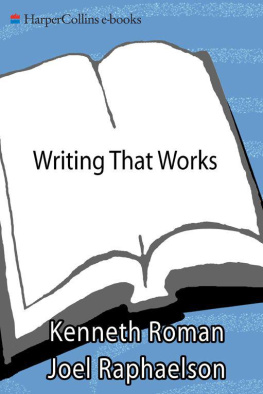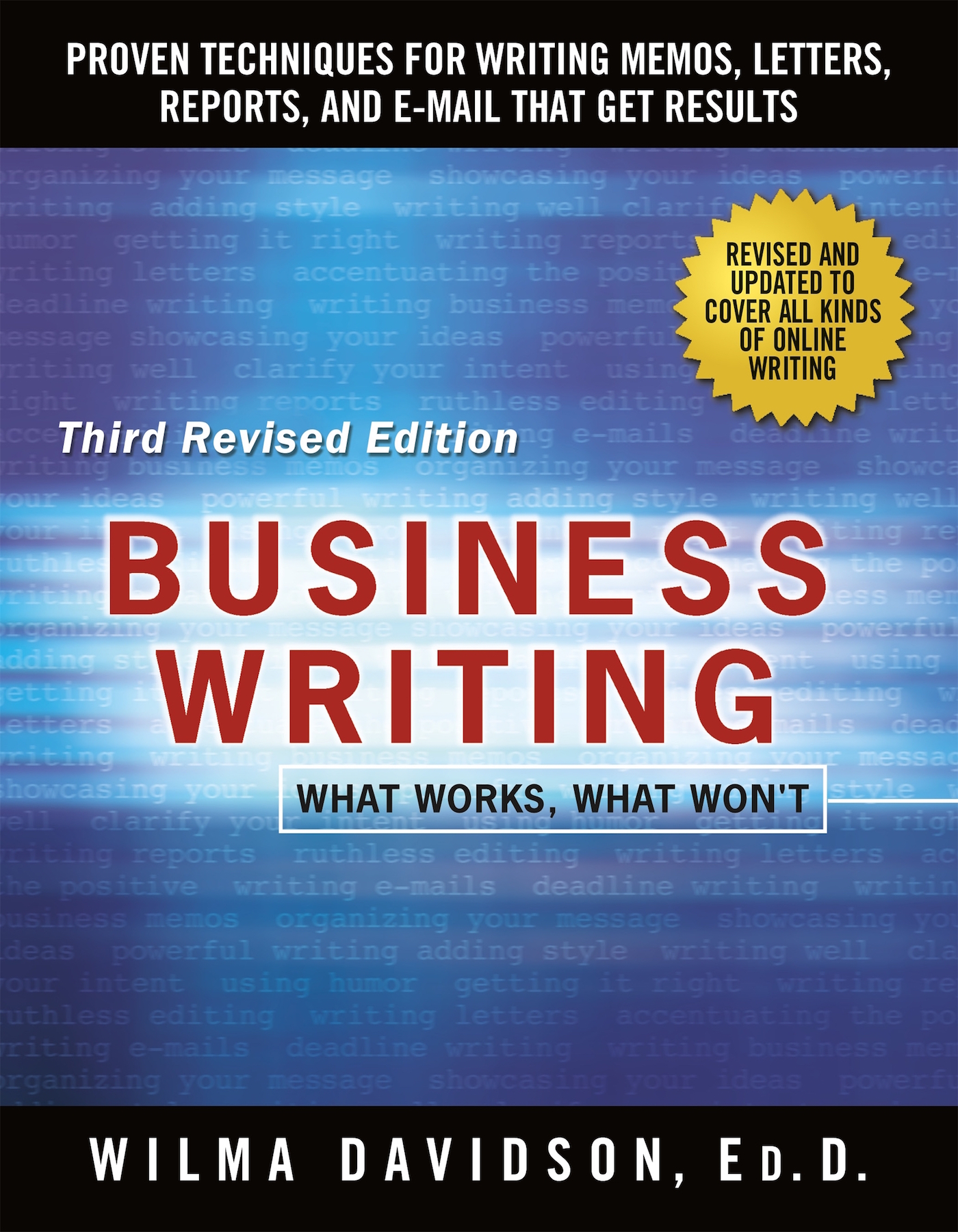Contents
Guide

The author and publisher have provided this e-book to you for your personal use only. You may not make this e-book publicly available in any way. Copyright infringement is against the law. If you believe the copy of this e-book you are reading infringes on the authors copyright, please notify the publisher at: us.macmillanusa.com/piracy.
To my husband, Steveand our children, Lisa and Eric
With this, the third revision of the book, I remain indebted to all who helped usher the first and second editions into existence. And I add to the top of that list those who have wisely and wittingly guided me through this third revision.
Meredith Mennitt, my editor at St. Martins Press, who graciously worked with me on this third revisionand whose energy and expertise have perfected it for you.
St. Martins Press, who bought the original manuscript in 1996 and has supported its updates ever since. I am proud to be among its steady selling authorsin print and digitally.
The students in my Professional Writing courses at the University of South Florida, Sarasota-Manateewho actually read the earlier editions and assured me the book is a keeper.
My clients and their companies, who, over the years, have responded thoughtfully and enthusiastically to my material and seminars.
Susan McCloskey, colleague and consultant, who always found order in my seeming disorder and whose gentle and apt suggestions always made sense.
Ellen Corum, who put my first draft on disk (remember those?) and never complained (well, almost never) about my incessant overhauling of the manuscripts early drafts.
Janet Emig, who, as my doctoral mentor, mapped the route to many of my ahas about teaching writing.
Tom Kish, who in spite of major transplant surgery, never had a sense-of-humor transplant and provided illustrations for my seminars and sketches to be adapted for the final artwork here.
Barbara Anderson, former senior editor at St. Martins, who liked the original manuscript (bless her!) and edited it with enduringand endearingcooperation and skill.
Marian Lizzi, former senior editor at St. Martins, who also enriched the first edition with her spirit and skill as assistant editor then; and who, with her hallmark grace, capably guided the second edition to completion. Indeed, Ive been twice blessed with her manner and her talent.
Family and friends, who have been my unconditional well-wishers.
What is it that Wilma Davidson knows? What qualifies her to advise us on what constitutes a winning business memo or monthly report?
As one of the first scholars to earn a doctorate by examining the types of writing unique to business, and as a consultant with three decades of experience helping corporate employees at all levels hone their business-writing skills, Wilma Davidson knows that most people are afraid of writing. And theyre afraid for good reason.
In most schools, writing wasand, alas, still ispresented as an assignment attached to an impossible-to-meet deadline. Rarely is advice given on how to navigate between assignment and finished product, advicesimply, centrally, awesomelyon how to write . Instead, what unhappily passes for the teaching of writing in too many schools is solely the grading of words on paper, with the reason for that C or D, or even A or B, an inexplicable and never-to-be-explained mystery. Too often students are sent off on a writing assignmentand then on to writing assignments in the corporate worldwith no guidelines on how to begin or how to know what works and what wont. Fear and anxiety are understandable responses to such a hopeless challenge.
In Business Writing: What Works, What Wont, Wilma Davidson demystifies the process of writing, particularly for those of us who must write on the joband that is almost everyone. She sets forth, using witty and pointed exemplars and exercises, how to overcome writing block; how to read what others want you to write; how to meet a range of expectations, from writing a business letter that states its purpose crisply and accurately to composing a report due tomorrowwith all varieties of the writing you must do set out in unpretentious yet carefully edited language, in prose others are compelled to read.
So here is help at last. Avail yourself of some of the best advice on writing you can ever hope to receive. Read. Heed. Practice. Write. Prosper.
Janet Emig
University Professor Emeritus of English Education Rutgers, The State University of New Jersey
To a three-year-old child, a crayon in the hand is pure power and enjoyment. Eagerly and effortlessly that youngster scribbles an imprint for the world to see. Yet by the time that child is an adult, and the crayon is replaced by pen, pencil, or computer, the sight of a blank page or blank screen is likely to provoke terror and helplessness.
When and where did so many of us learn to dislike, and even fear, an activity that was once natural and fun? Chances are, it was the moment writing became associated with being graded and judged. Most likely, this happened in schoolwhere, unwittingly, early instruction stressed perfection rather than growth; where misguided teaching sought to correct and eliminate every error at once instead of encouraging experimentation and learning through mistake-making; where to collaborate with another was not only discouraged but often viewed as cheating; where the goal was to impress the teacher by the papers lengthnot its message.
No wonder so many of us began to hate writing. Dutifully corrected by well-intentioned teachers, each paper punctured our self-esteem. But, like it or not, we learned to writefor the world of school, that is: Use big words, fill lots of pages, impress the teacher.
But writing in the business world demands different skillsskills not necessarily learned in school. In school we wrote for the teacher only. In the workplace we write for broader audiences with varying needs and expectations. And our business audience is far less patient about wading through our inch-thick reports or reading between the lines for our point. All too often the business writer confuses the goal of business writing with the goal of school writing. In business we write to get a job done, a problem resolved, an action recommended or approved. In school we write to impress the teacher with our display of knowledge and vocabulary.
While this book does not concern itself with school writing, it is adamant about overcoming its legacy. One goal here, then, as in my seminars and private consulting, is to help business writers discard an impoverished view of writing that originated in school and to enlighten them about what worksand wontin the workplace. The book focuses on the attributes found in the best business writing and on the principles we can follow to make these qualities our own.
A second goal is to remind business writers that although writing well is often challenging, it can just as often be comfortable. Rediscovering that fact will help us once again write effortlessly and emphatically.
Three premises energize this book and my workshops. And these premises are strongly supported by considerable and reputable research into how writing is best learned:
1. We learn to write by writing, often by playful practice, texting and tweets included. Thats why the book is filled with exercises for you to try.
2. We learn to write by discussing our writing with others, by trying it out and getting feedback. Thats why sample memos have been included for you to compare with the versions you draft. Its my way of providing feedback, even if only indirectly.


